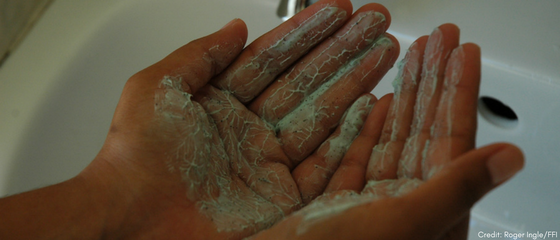UK's proposed ban could miss important products containing microplastics

A survey led by the microbeads coalition has revealed that limitations of the U.K. government's proposed ban could let microplastics slip through loopholes.
YouGov polling for the microbeads coalition has shown that a large proportion of people wash make-up and skincare products down the drain. Yet while some of these product types have been shown to contain microplastic ingredients, they could fall outside of the government's proposed microbeads ban.
Defra's current proposal is restricted to "rinse-off" products, an ambiguous term which has caused confusion among industry and campaigners alike. But these findings suggest that products containing microplastics will continue to enter the ocean if the government excludes them from the microbeads ban.
The survey found that:
- 42% of users wash off face make-up (e.g. foundation, blusher, concealer) down the drain
- 60% of people who don't use make-up, but do use skincare products like sun cream wash them down the drain
- A third of people using lip and eye products wash them down the drain (33% and 34% respectively)
- Across all three make-up types, 42% of people who wear make-up end up washing it down the drain
The poll also found that the majority of people who wear any make-up (61%) rarely or never read product label information regarding removal methods for face, eye and lip make-up products.
Below is a joint statement from the microbeads coalition, which consists of the Environmental Investigation Agency, Fauna & Flora International (FFI), Greenpeace UK and the Marine Conservation Society:
'Many countries around the world, from India to Korea to New Zealand, are now looking at banning microplastics in products that can end up in the sea, and they're looking to the UK to provide a model of how best to do that. By implementing a robust and comprehensive ban of microplastics in all products which can reach drainage, this government can have a truly global impact.
'We've already seen the problematic loopholes in the US legislation, which limited the ban to "rinse off" products that perform an "exfoliating" function and ended up allowing other types of products containing microplastics to keep pouring into our oceans.
'With trillions of microplastics already in the sea, this really is a global issue and the British Government must seize the opportunity to create a world-leading ban.'
Specifically, we ask the government to follow the guidelines below recommended by the Environmental Audit Committee and developed by FFI:
- Any definition of 'microbeads' must include all solid plastic ingredients smaller than 5mm used for any purpose (not just for exfoliation). There should be no lower size limit included in the definition;
- The legislation should cover all products that are washed down the drain or are directly discharged into waterways or the marine environment. This includes a wide range of cosmetic and personal care products as well as cleaning products, make-up, and industrial products;
- Legislation should not allow so-called 'biodegradable' plastics to be used as alternatives, as these materials do not degrade in the marine environment and therefore are not a solution to the problem;
- There should be a clear and prompt timeline for phasing out these ingredients, and a date after which products containing microplastics must not be sold.
Provided by Fauna & Flora International




















